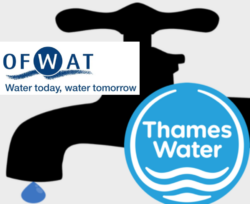 Abraham Lincoln
If given the truth, the people can be depended upon to meet any national crisis...
Abraham Lincoln
If given the truth, the people can be depended upon to meet any national crisis...
 Guildford news...
for Guildford people, brought to you by Guildford reporters - Guildford's own news service
Guildford news...
for Guildford people, brought to you by Guildford reporters - Guildford's own news service
‘What Is Ofwat Doing?’ Asks a Customer
Published on: 14 Apr, 2024
Updated on: 16 Apr, 2024
 “What is Ofwat doing?” was one question posed at the public meeting with Thames Water’s new boss on Friday (April 12).
“What is Ofwat doing?” was one question posed at the public meeting with Thames Water’s new boss on Friday (April 12).
See also: You Don’t Believe Us! Angry Residents Tell New Thames Water CEO
The question was met with applause. It has probably been asked by many Thames Water customers who feel they can no longer rely on water flowing from their taps.
The Water Services Regulation Authority, more usually known as Ofwat, is a “non-ministerial government department”.
It is the economic regulator for the water and sewerage sectors in England and Wales responsible for making sure that the companies it regulates provide consumers with a good quality and efficient service at a fair price. Many have questioned why the regulator has not been more effective in policing water companies delivering poor service.
The customer at the meeting said to the Thames Water representatives: “I appreciate the fact that you’re doing your very best for your business and trying to sort out these problems.
“As somebody who’s got no idea what you do for a job, I’m sure you’re earning your money, dealing with all these questions, but the question I’d like to know is what is Ofwat doing?
“Thames Water says it doesn’t have the money and the resources to provide the service we’re all paying for but you [Ofwat] fine them and that makes the problem even worse!”
The chair of Ofwat, David Black was at the meeting but had been largely sidelined because of the focus on compensation payment, or lack of them.
But he seemed keen to respond: “Yes, they [Thames Water] need to have adequate financial resources. And that’s something that we’ll examine in their business plans. Were also very keen to make sure that customers do not pay for inefficient levels of service.
We’re very clear that they’re not performing customer service in the way that they ought to be. The evidence in this room is very clear on that. They have been consistently the worst in the sector. Yes, I agree.
“As an organisation, we do want them to perform better, but where they’re not providing the service we can only, as a regulator, either incentivize them to perform better, or we can take enforcement action against them.”
He said Ofwat has new powers so that where companies fall short and fail to follow up and respond they have much greater ability to enforce. They are also setting new guidelines and standards and working with the Consumer Council for Water (CCW) to drive up performance in the sector.
The Ofwat chair continued: “I’m calling in all the all the CEOs in the sector to focus on customer service. It’s really important with all the issues and concerns about the environment that customer service is not forgotten. The sector needs to do better on customer service. It’s nowhere near good enough. And I’m personally committed to try to drive change in that space.”
He said it was not just about the amount of investment they’ve made, it’s about how they operate the exiosting systems as well which is why Ofwat is focusing on the level of supply interruption performance, or we do monitor their customer service. He intended to do everything Ofwat can, with the extra resources provided by the government, to take more action against companies at a faster rate.
“But we’re also looking at this price review which will be a record price view in terms of investment, and that will benefit the environmental benefit and the resilience of services.”
Jeremy hunt asked for a one word answer to the question: “There will be no bill increases to pay for Thames Water management failures, correct?
The chair of Ofwat answered: “Yes”
Thames Water’s financial woes
In response to fresh reports of Thames Water’s financial troubles (See BBC article: Why is Thames Water in so much trouble?) Ofwat issued the following statement on March 28:
“[The] update from Thames Water means the company must now pursue all options to seek further equity for the business to turn around the performance of the company for customers. Thames Water is a business with a regulatory capital value of £19 billion, with £2.4 billion of liquidity available, an annual regulated revenue of £2 billion and a new leadership team.
“Ofwat’s PR24 price control will put customer and environmental priorities at the heart of the water sector. In order to drive this change, we need to ensure that the sector attracts investment and is fair to bill payers. Since 2020 nearly £4.6 billion new equity has been injected into the sector. We will set out our draft determinations in June this year.
“We also need to see companies deliver the performance that customers expect and that they are run in a way that meets customers’ expectations.”
But Kemble shareholders halted a £500 million down-payment on that promised cash injection when regulator Ofwat rejected plans to raise customer bills by 40 per cent above inflation over the next five years.
Kemble’s new shareholders have told the BBC they are not prepared to throw more capital at a company that is losing money and they appear to have reconciled themselves to the fact their shares are worth nothing,
The amber alert is at Thames Water itself, which is ring-fenced, regulated, £14.7 billion in debt and 100 per cent-owned by parent company Kemble. The new boss, Chris Weston, has tried to allay fears by saying it had enough in cash and overdraft facilities to keep ticking over till next May, but at some point Thames will need a fresh cash injection.
Responses to ‘What Is Ofwat Doing?’ Asks a Customer
Leave a Comment Cancel reply
Please see our comments policy. All comments are moderated and may take time to appear. Full names, or at least initial and surname, must be given.
Click on cartoon for Dragon story: Public Asked for Views on SCC’s Proposal for Reduced Speed Limits


Recent Articles
- Police Investigating Wildlife Attacks At Fleet Pond Issue Three E-fits
- Wildlife Conservation Project Seeks To Protect Some of Surrey’s Rarest Habitats
- Dragon Interview: What’s Reform Guildford’s View of Local Government Reorganisation?
- ‘Astonishingly Clever’ SCC Show Garden Wins Silver for Turning Parking Spaces Green
- New Air Quality Strategy to Improve Pollution Approved by Guildford Borough Council
- Co-founder of Surrey Pride Found Guilty of Rape of 12-year-old Boy
- July By-elections To Show Relative Standings of Political Parties
- Birdwatcher’s Diary No.330 Bempton Cliffs
- Notice: Invisible Things at Guildford House – July 5 to September 27
- GBC Asks Residents for Views on Its Draft Building Height Guidance


Recent Comments
- Sara Tokunaga on Letter: A Simple Footbridge Should Have Been Affordable to Keep Towpath Over Weir Open
- Paul Crosthwaite on Hitting The Guildford Music Scene In The Sixties With Blues Band The Crow Janes
- Paul Robinson on Letter: A Simple Footbridge Should Have Been Affordable to Keep Towpath Over Weir Open
- Paul Gorton on Public Asked for Views on SCC’s Proposal for Reduced Speed Limits
- Jim Allen on GBC Asks Residents for Views on Its Draft Building Height Guidance
- D Bisdee on Drivers Caught in Yellow Box Junctions at the Dennis Roundabout Paid £81k to SCC
Search in Site
Media Gallery
Dragon Interview: Local Artist Leaves Her Mark At One of England’s Most Historic Buildings
January 21, 2023 / No Comment / Read MoreDragon Interview: Lib Dem Planning Chair: ‘Current Policy Doesn’t Work for Local People’
January 19, 2023 / No Comment / Read MoreA3 Tunnel in Guildford ‘Necessary’ for New Homes, Says Guildford’s MP
January 10, 2023 / No Comment / Read More‘Madness’ for London Road Scheme to Go Ahead Against ‘Huge Opposition’, Says SCC Leader
January 6, 2023 / No Comment / Read MoreCouncillor’s Son Starts Campaign for More Consultation on North Street Plan
December 30, 2022 / No Comment / Read MoreCounty Council Climbs Down Over London Road Works – Further ‘Engagement’ Period Announced
December 14, 2022 / No Comment / Read MoreDragon Interview: GBC Reaction to the Government’s Expected Decision to Relax Housing Targets
December 7, 2022 / No Comment / Read MoreHow Can Our Town Centre Businesses Recover? Watch the Shop Front Debate
May 18, 2020 / No Comment / Read More







Ben Paton
April 18, 2024 at 1:00 pm
Ofwat is a failed regulator, captured for decades by the companies it is supposed to regulate.
The former chairman of Ofwat (chairman from 2012 to 2021) spent much of his career running water companies: Jonson Cox ‘served as Managing Director of Yorkshire Water (1996-2000) to lead the company out of a significant crisis with its customers and restore YW’s top-ranking status in the industry. After other infrastructure roles, he returned to the water sector for over six years from 2004 – 2010 as Group CEO at AWG [Anglian Water Group] plc.’
https://www.gov.uk/government/news/ofwat-chair-appointment-extended-and-board-members-reappointed
The Observer and the Guardian reported last year that many of the senior executives at the water companies formerly worked for the regulator: “Two-thirds of England’s biggest water companies employ key executives who had previously worked at the watchdog tasked with regulating them, the Observer can reveal.
An analysis by the Observer has found 27 former Ofwat directors, managers and consultants working in the industry they helped to regulate, with about half in senior posts.”
https://www.theguardian.com/environment/2023/jul/01/exclusive-uk-water-giants-recruit-top-staff-from-regulator-ofwat
In effect the regulator is now regulating its former employees. Very cosy.
How has the chronic pollution of our rivers come to pass?
Part of the problem is the division of responsibilities – such that in the final analysis no one takes responsibility. Ofwat sets water prices and the Environment Agency is supposed to protect the environment. It appears that the environment is not part of Ofwat’s mission. It leaves that the EA. The EA in its turn is hopelessly underfunded and does not employ enough staff to look after one water basin – let alone the entire country.
And the politicians? They all say that HM Government has an ‘arms length’ relationship with Ofwat and the EA. That is almost as ridiculous as HM Government saying that it is not responsible for the ongoing train wreck that is Post Office Ltd.
Ofwat and the Environment Agency have not done their jobs:- not for a year or two but for a decade or two.
‘Quis custodiet ipsos custodes.’ So who is supposed to make sure that the regulators do their jobs? Why HM Government of course.